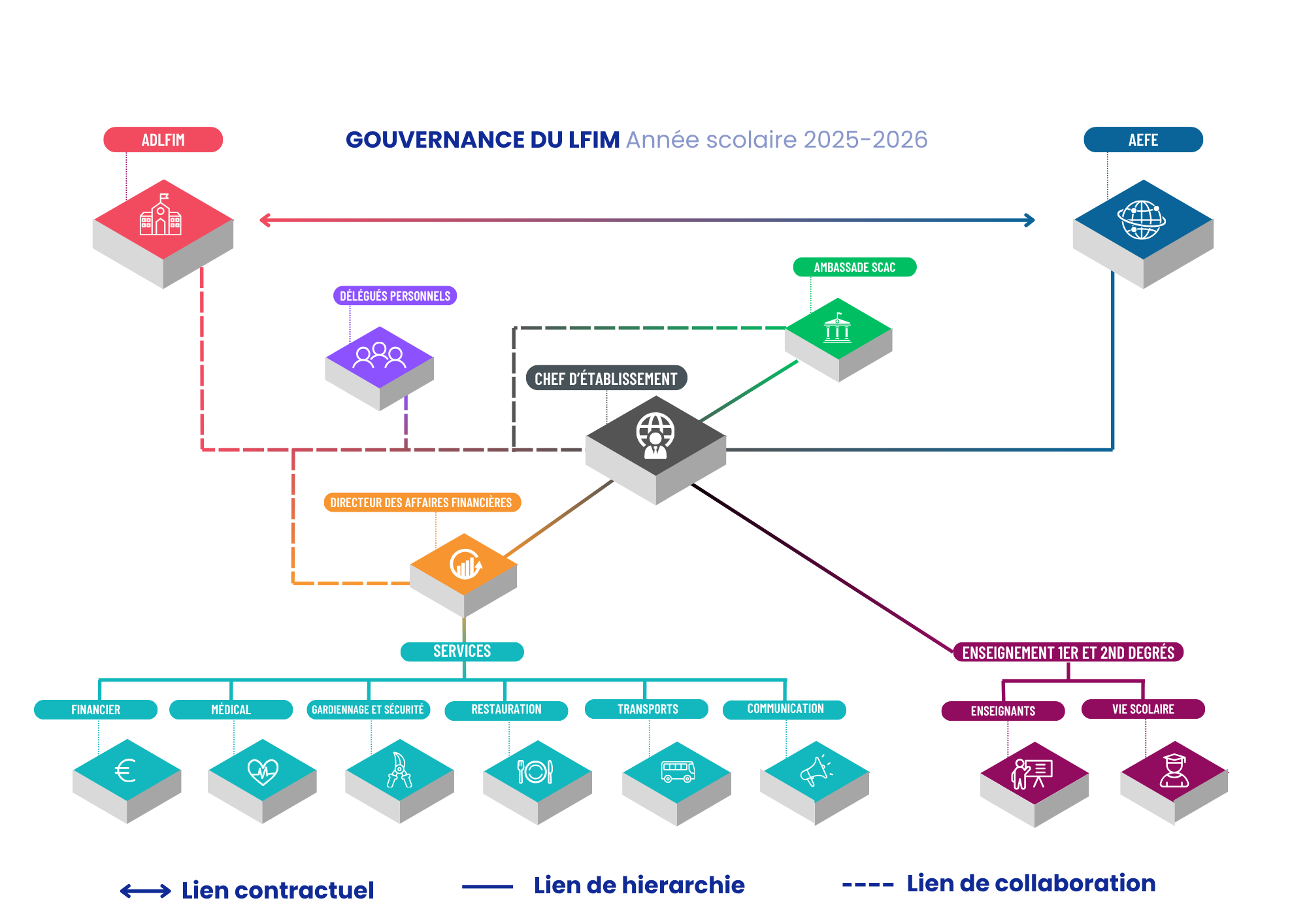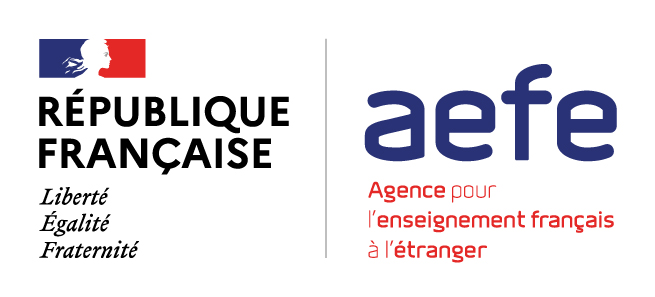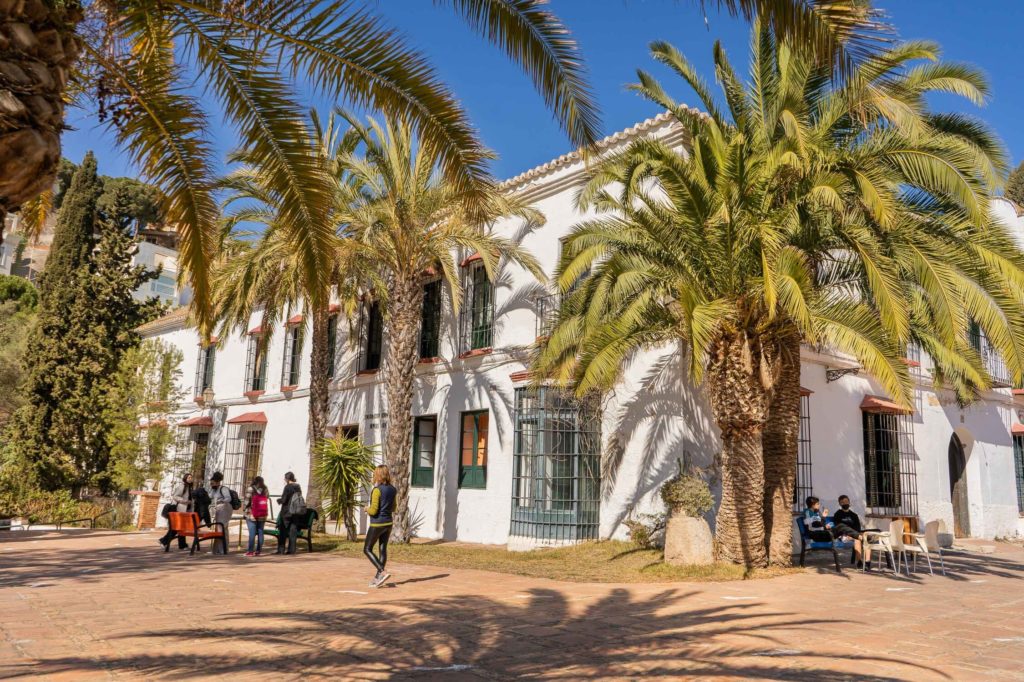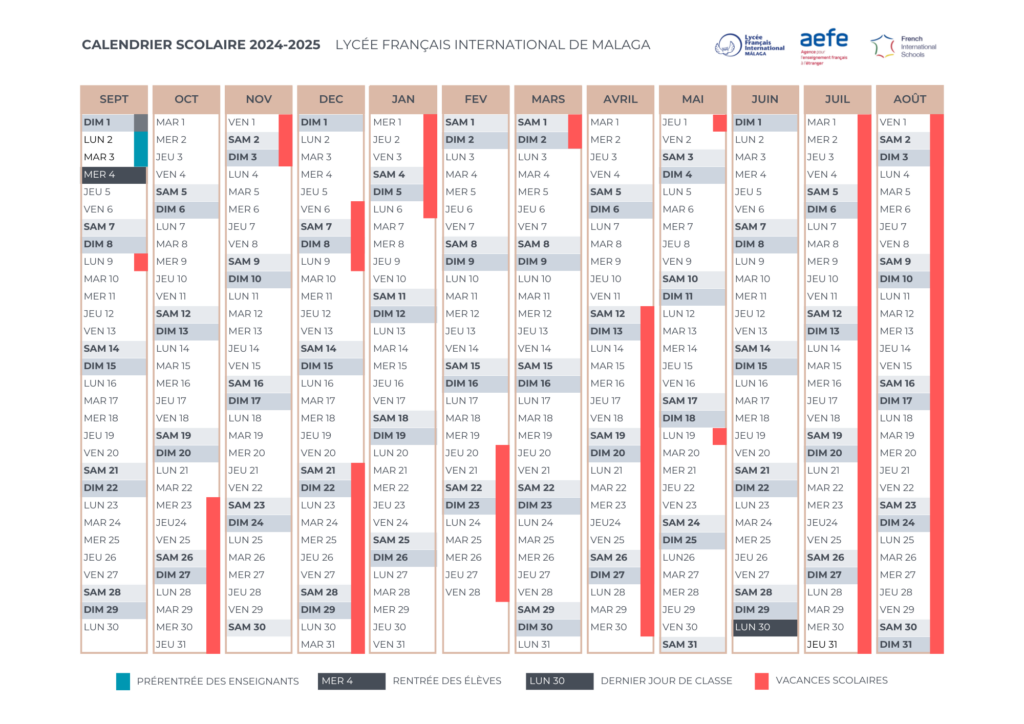Learn more about instances
The Lycée Français International de Málaga is a private institution with an agreement with the Agency for French Education Abroad (AEFE), itself a national public administrative institution under the supervision of the Ministry of Foreign Affairs and Cooperation. The Agency, which was created by the Law of 6 July 1990, is represented in Madrid by the Cultural Services.
The approved establishments are managed by associations or foundations under private law, French or foreign, and have entered into an administrative, financial and educational agreement with the AEFE. This agreement covers in particular the conditions of assignment and remuneration of permanent agents of National Education and the allocation of subsidies. These establishments maintain a constant management dialogue with the AEFE.
The Lycée Français International de Málaga falls within the scope of bilateral agreements (Convention of February 7, 1969 clarified by that of June 2, 1977 – Royal Decree nº 806/93 of May 28, 1993) between the Spanish and French states, students who have completed all of their secondary studies at LFI Malaga thus benefit from permanent validation of their studies in the two education systems.
The Lycée Français International de Málaga works thanks to tuition fees paid by parents as well as subsidies from the AEFE by taking charge of part of the salaries of "resident" teachers (teachers holding the French National Education ) as well as the salaries of expatriates (headmaster and primary school director).
The Lycée Français International de Málaga is managed by the Management Committee of the Association for the Development of the Lycée Français International (ADLFIM) and headed by a Head of Establishment (Principal), a French civil servant appointed by the France. The organization, management and administration of the school is governed by the standards set by the AEFE
ADLFIM is registered with the Registro de Asociaciones de la Junta de Andalucía, Consejería de Justicia e Interior, on December 18, 2014 (nº 29-1-1252), as a non-profit association.
The Management Committee is its representative and management body. It is made up of members who act on a voluntary basis without being able, under any circumstances, to be remunerated for the exercise of their functions. The statutes of ADLFIM can be consulted freely. The establishment's budget, drawn up by the administrative and financial director, assisted by the head of the establishment and the director of primary education, and approved by the Management Committee, is subject to the compliant visa of the AEFE.
The funds available at the end of each budget period are not considered profits but reinvested in the Lycée Français International de Málaga: educational projects, improvements to facilities, acquisition of materials, etc. This aspect sets us apart from most similar establishments. The Head of Establishment assumes full responsibility for the educational organization and operation, as well as for the school life of the establishment. In connection with the inspection bodies, he is the guarantor of the conformity of the lessons with the rules of the homologation. The Head of Establishment ensures, by delegation of the managing body, the proper functioning of the establishment in material, human, real estate and financial terms. He is closely and permanently associated with the management of the establishment and provides all the information necessary for the managing body.

The establishment council is the main body of the establishment, competent for the 1st degree, the 2nd degree.
1.1 Allocations
- He is competent for all that concerns the pedagogical and educational questions of the establishment.
- It adopts its rules of procedure.
Based on the preparatory work reported and presented by the head teacher, the school board:
1° Adopt:
- the establishment project, on the proposal of the school council and the secondary school council;
- the establishment's internal regulations after consultation with the preparatory bodies (school council, secondary school council and council of delegates for high school life);
- school timetables and the calendar of the school year;
- the annual guidance education plan;
- the continuous training plan for the personnel of the establishment in all its components, on the proposal of the continuous training unit;
- the annual action program of the school-college council;
- the annual action program against all forms of violence, discrimination and harassment;
- the annual action program for education in sustainable development and citizenship education;
2° Issues an opinion formed by a vote on:
- the job map (creation, deletion and transformation) of the personnel of the establishment;
- proposals for changing teaching structures;
- health and safety issues for the whole school community;
- issues of health, safety and working conditions of personnel;
- issues relating to the reception and information of parents of pupils, the general terms of their participation in the life of the establishment;
- the programming and financing of school trips;
- the organization of educational life;
the specific missions assigned to staff after presentation to the educational council; - welcoming and caring for pupils with special educational needs;
- school catering;
3° Is informed about:
- The establishment's specific safety plan (PPMS) is presented to the establishment council for information.
- A report on the pedagogical operation and a progress report on the establishment project are presented to the establishment council each year by the head of the establishment.
- The budget and the financial account of the establishments under agreement, the strategic orientations of the establishment, are the subject of detailed information to the establishment council.
- school catering;
1.2 Membership
The establishment council is a tripartite body composed of an equal number of ex officio members representing the administration, representatives of the establishment's staff and representatives of the parents of pupils and pupils.
The number of ex officio members determines the number of members of the establishment council.
The establishment council is chaired by the head of the establishment or, in the event of impediment, by one of his deputies.
The establishment council includes, in respect of:
Members sitting with voting rights:
Members of the administration:
the head of the diplomatic post or his representative;
the Proviseur ;
the deputy principal to the head of the establishment;
the administrative and financial director;
the main education adviser ;
the director(s) of the primary classes.
Representatives of teaching and education staff and administrative and service staff
Representatives of parents of pupils and secondary school pupils
Members serving in an advisory capacity:
– the French consul or his representative;
– the consular advisers of the district concerned;
– the vice-president of the council of delegates for high school life;
– two local personalities chosen for their competence in the social, economic and cultural field on the proposal of the head of the establishment;
– the president of the alumni association or his representative;
– two representatives of the management board or the board of directors of the managing body in the approved establishments;
– the director of studies or the coordinator of national teaching, where applicable, when the position exists;
– the delegated coordinator of the AEFE management, when the position exists;
– the deputy administrative and financial director, when the position exists.
Based on the preparatory work reported and presented by the head teacher, the school board:
1.3 Operation
• Periodicity
The establishment council meets in ordinary session at the initiative of the head of establishment at least once per quarter. It may also meet in extraordinary session at the request of the head of the diplomatic post or his representative, the head of the establishment or at least half of its members entitled to vote, on a specific agenda.
• Summons
The head of the establishment sets the dates and times of the sessions. He sends the convocations accompanied by the draft agenda and the preparatory documents, at least eight clear days in advance. In urgent cases, this period may be reduced to one day.
The president can invite any person whose contribution is considered useful according to the agenda.
• Quorum
The establishment council can only sit validly if the number of members present at the start of the meeting is greater than half of the members entitled to vote making up the council. If this quorum is not reached, the establishment council is convened for a new meeting, which must be held within a minimum period of five days and a maximum of eight days; it then sits validly regardless of the number of members present. In urgent cases, this period may be reduced to three days.
• Agenda
The agenda is drawn up by the head of the establishment after registration of the questions which have been the subject of a prior request and adopted at the start of the meeting.
• Minutes
At the start of each meeting, the chairman appoints a meeting secretary, member of the administration, and an assistant secretary. The latter is chosen in turn from among the representatives of staff and parents of students.
The minutes, drawn up under the responsibility of the head of the establishment, are sent to the members of the council, to the AEFE and to any other entities responsible for the establishment.
It is adopted at the opening of the following meeting, posted on the establishment's premises for a period of four months and on the website. The members of the educational community are informed of the availability of the minutes.
• Voting by secret ballot
The secret vote is of right as soon as a member of the council requests it.
Board members are subject to the obligation of discretion.
In the event of an equal division of the votes, the voice of the president of the establishment council is preponderant.
A school council is set up in all establishments which include primary education placed under the responsibility of a school principal.
2.1 Allocations
The school council adopts the school's internal regulations on the proposal of the school director.
This council must be consulted for its opinion on all questions relating to the operation and life of the school, in particular on:
- pedagogical structures;
- organization of school time and calendar;
- the school project or the establishment project in its 1st degree part on the proposal of the teachers' council;
- specific actions to ensure better use of the resources allocated to the school and good adaptation to its environment;
- the conditions for adjusting the schooling of pupils with special educational needs;
- the projects and organization of discovery classes;
- issues relating to the hygiene, health and safety of students in the school and extracurricular context;
- the principles for choosing teaching materials and tools;
- issues relating to reception, information for pupils' parents and the general terms and conditions of their participation in school life.
- the annual action program of the school-college council;
- the annual action program against all forms of violence, discrimination and harassment;
- the annual action program for education in sustainable development.
2.2.Compositions
The school council is chaired by the school director.
Ex officio members are:
– sitting with voting rights:
* in schools with 15 classes or more
– the school principal,
– 15 teachers including at least one per level of education,
– one of the specialist teachers intervening in the school, when the post exists, chosen by the council of teachers,
– 15 representatives of parents, including at least one per level of education.
– sitting in an advisory capacity:
– the head of the establishment, or, in case of impediment, his deputy,
– the administrative and financial director,
– the national education inspector in residence.
In addition, representatives of other staff who work in the school may attend, also in an advisory capacity, the school council.
The chairman, after consultation with the board, may invite any person whose consultation is deemed useful depending on the agenda.
2.3 Designation of parents of students
The representatives of the parents of pupils are elected by list ballot with proportional representation to the greatest remainder. For each holder, a substitute is elected under the same conditions.
Each list of candidates comprises, classified in a preferential order which will determine the allocation of seats, the surnames and first names of the candidates without any distinction being made between holders and substitutes.
The lists include at most a number of candidates equal to twice the number of seats to be filled. They may not be complete but must include at least two names.
Each legal representative (parents, guardian, etc.) is an elector and eligible, provided that they exercise certified parental authority over the child enrolled in the establishment, subject to compatibility with local law (assessment by the head of post).
Each legal representative (parents, guardians, etc.) has only one vote, regardless of the number of children enrolled in the establishment.
1st degree staff working in the establishment, members by right of the school council, are not eligible for the parents' college.
The duration of the mandate of the elected members of the school council is one year and expires on the day of the first meeting of the council following its renewal.
The school principal is responsible for preparing the elections and organizing the vote.
The procedures for organizing the elections are specified at the end of the circular.
2.4 Operation
The school council is constituted for one year and sits validly until the renewal of its members.
The school council meets in ordinary session on a specific agenda at least once per quarter and necessarily before the establishment council, and before any extraordinary establishment council if the agenda justifies it.
It can also meet in extraordinary session at the request of the school director or half of its members with voting rights.
The agenda and the preparatory documents are sent to the members of the board at least ten clear days before the date of the meeting. This period may be reduced to three days in the event of an emergency.
At the start of each meeting, the chairman appoints a meeting secretary and an assistant secretary, responsible for drawing up the minutes. The assistant secretary is chosen in turn from among the representatives of the staff and the parents of pupils.
The minutes are drawn up by the chairman and adopted at the opening of the following meeting. It is sent to the members of the school council and the establishment council and posted on the school premises for a period of four months as well as on the website. The members of the educational community are informed of the availability of the minutes.









